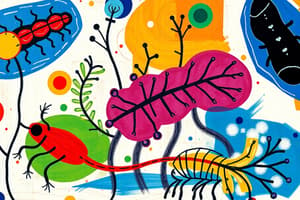Podcast
Questions and Answers
What does the Independent Variable represent in an experiment?
What does the Independent Variable represent in an experiment?
- The outcome measured in response to experimental treatment
- The factor that is being tested in the experiment (correct)
- The group that does not receive the experimental treatment
- The conditions that are kept constant throughout the experiment
What term describes the attraction of molecules of different kinds?
What term describes the attraction of molecules of different kinds?
- Surface Tension
- Cohesion
- Adhesion (correct)
- Capillary Action
Which of the following is a benefit of having a study partner?
Which of the following is a benefit of having a study partner?
- To help solidify understanding and explore different methods (correct)
- To have someone correct your grammar
- To share study materials without discussing concepts
- To rely solely on them for answers during study sessions
Which type of bond is characterized by electrons being shared unequally?
Which type of bond is characterized by electrons being shared unequally?
What is the role of a Control Group in an experiment?
What is the role of a Control Group in an experiment?
What is the primary function of mitochondria in a cell?
What is the primary function of mitochondria in a cell?
What physical property of water allows it to stabilize temperature changes?
What physical property of water allows it to stabilize temperature changes?
Which method involves reviewing material by explaining it to oneself or another person?
Which method involves reviewing material by explaining it to oneself or another person?
Which process involves the creation of larger molecules from smaller units?
Which process involves the creation of larger molecules from smaller units?
What does a Negative Control Group in an experiment typically involve?
What does a Negative Control Group in an experiment typically involve?
Which organelle is responsible for breaking down waste materials and cellular debris?
Which organelle is responsible for breaking down waste materials and cellular debris?
What causes evaporative cooling in organisms?
What causes evaporative cooling in organisms?
How do hydrogen bonds differ from covalent bonds?
How do hydrogen bonds differ from covalent bonds?
What are the building blocks of proteins called?
What are the building blocks of proteins called?
What is the significance of the surface to volume ratio in cells?
What is the significance of the surface to volume ratio in cells?
What is the primary function of the thylakoids in chloroplasts?
What is the primary function of the thylakoids in chloroplasts?
Which of the following statements about the Calvin cycle is correct?
Which of the following statements about the Calvin cycle is correct?
What role does the enzyme RuBisco play in the carbon cycle?
What role does the enzyme RuBisco play in the carbon cycle?
Which type of spectrum shows the effectiveness of different wavelengths of light in driving photosynthesis?
Which type of spectrum shows the effectiveness of different wavelengths of light in driving photosynthesis?
What happens to electrons when light is absorbed by chlorophyll?
What happens to electrons when light is absorbed by chlorophyll?
Flashcards
Covalent bond
Covalent bond
A chemical bond formed by the sharing of electron pairs between atoms.
Polar covalent bond
Polar covalent bond
A covalent bond where electrons are shared unequally between atoms due to differences in electronegativity.
Hydrogen bond
Hydrogen bond
A weak interaction that forms between a hydrogen atom covalently bonded to a highly electronegative atom (like oxygen) and a lone pair of electrons in another electronegative atom.
Cohesion
Cohesion
Signup and view all the flashcards
Adhesion
Adhesion
Signup and view all the flashcards
Independent Variable
Independent Variable
Signup and view all the flashcards
Dependent Variable
Dependent Variable
Signup and view all the flashcards
Control Group
Control Group
Signup and view all the flashcards
Experimental Group
Experimental Group
Signup and view all the flashcards
Control Variables
Control Variables
Signup and view all the flashcards
Hydrophobic Molecules
Hydrophobic Molecules
Signup and view all the flashcards
Dehydration Synthesis
Dehydration Synthesis
Signup and view all the flashcards
Hydrolysis
Hydrolysis
Signup and view all the flashcards
Catabolism
Catabolism
Signup and view all the flashcards
Anabolism
Anabolism
Signup and view all the flashcards
Stroma
Stroma
Signup and view all the flashcards
Thylakoids
Thylakoids
Signup and view all the flashcards
Grana
Grana
Signup and view all the flashcards
RuBisCo
RuBisCo
Signup and view all the flashcards
Photosystem II
Photosystem II
Signup and view all the flashcards
Study Notes
Exam Information
- The exam will be a mixture of multiple-choice and short-answer questions.
- Short answers will typically require one sentence.
- The exam will cover the entire allotted time period.
Resources for Studying
- Review videos from Amoeba Sisters, Bozeman Science, Crash Course, and Khan Academy.
- Review study guides and analysis packets to assess understanding.
- Utilize Quizlets and Mastering Biology videos.
- Use AP Classroom videos and questions.
Study Skills
- Work through blank analysis packets, checking answers.
- Collaborate with a study partner to clarify concepts, and develop alternative methods.
- Create note guides, focusing on unclear aspects.
- Use the textbook's vocabulary flashcards (or Quizlets) to reinforce key terms.
- Explain the material to oneself or others for deeper understanding.
Group Goals
- Create a study guide with concepts, terms, and diagrams.
- Comparisons are helpful (e.g., active vs. passive immunity).
- Indicate difficulty scores for each chapter (1 to 3), with 1 representing fewer questions.
Experimental Design
- Independent Variable: Factor being tested.
- Dependent Variable: Measures the response to the IV.
- Control Variables: Factors kept constant.
- Experimental Group: Receives experimental treatment.
- Control Group: Used for comparison.
- Negative Control: Placebo; no treatment.
- Trials: Number of repetitions.
Basic Chemistry
- Four most common elements: C, H, O, N.
- Energy levels of electrons: High/low shells are closer/further from the nucleus.
- Chemical bonds: Single, double, etc., based on electrons shared.
- Electronegativity: An atom's attraction for electrons in a chemical bond.
- Polar vs. Nonpolar bonds: Polar bonds have unequal sharing; Nonpolar bonds have equal sharing of electrons.
- Molecular shape affects function.
- Hydrogen bonds: Form through partially negative/positive charges (e.g., hydrogen is partially positive, oxygen is partially negative).
Water
- Cohesion: Attraction of like molecules.
- Adhesion: Attraction of unlike molecules.
- Capillary Action: Liquid flow in narrow tubes due to cohesion and adhesion.
- Surface Tension: Liquid's resistance to rupture from cohesion.
- Specific Heat: Amount of heat required to change water's temperature.
- Evaporative Cooling: Heat carried away when water evaporates.
Carbon Compounds
- Isomers: Molecules with the same formula, but different atom arrangement.
- Functional Groups: Specific groups of atoms (e.g., Hydroxyl -OH; Carboxyl -COOH; Amino -NH2; Sulfhydryl -SH; Phosphate -PO4).
- Each functional group has specific properties that affect the behavior of the molecule.
Structure and Function of Biological Molecules
- Proteins, carbohydrates, nucleic acids, and lipids are macromolecules.
- Focus on building block structures, polymers, and dehydration synthesis vs. hydrolysis.
- Understand how the structure of a molecule relates to its function.
- Understand anabolic vs. catabolic pathways, their definitions, and the significance of metabolism.
Cell Types & Parts
- Prokaryotes vs. Eukaryotes.
- Plant vs. Animal cells.
- Understand functions of each cell part (cytoplasm, nucleus, ER, lysosomes, vacuoles).
- Surface area to volume ratio implications for cells.
- Mitochondria vs. chloroplast comparison.
Membrane Structure & Cellular Transport
- Cell membrane composition (phospholipids, two protein types).
- Protein functions in cell membranes (transport, signal transduction, etc.).
- Osmosis: Movement of water across a semipermeable membrane, from low to high solute concentration.
- Types of transport proteins (channel & carrier).
Intro to Metabolism
- Enzymatic reactions: lock-and-key model.
- Enzyme effects of temperature, shape, pH, and chemicals.
- Exergonic vs. Endergonic reactions.
- Catabolic vs. Anabolic pathways.
- Role of ATP.
- Competitive vs noncompetitive inhibitors.
Cellular Respiration and Fermentation
- Glycolysis, Krebs Cycle, and Oxidative Phosphorylation steps, and locations, of cellular respiration.
- Alcoholic vs. Lactic acid fermentation.
- Significance of oxygen.
Photosynthesis
- Thylakoids, stroma, and grana.
- Light-dependent and light-independent reactions.
- Role of pigments.
- Photosystem I vs Photosystem II processes.
- Chemical equation.
Cell Communication
- Ligand-receptor interactions.
- Signal transduction pathway steps.
- Types of cell signaling (autocrine, juxtacrine, paracrine, endocrine).
- Protein Kinase vs. Phosphatase function.
Cell Cycle, Meiosis & Sexual Life Cycles
- Cell cycle phases (G1, S, G2, M).
- Mitosis vs. Meiosis.
- Importance of meiosis in genetic variation.
- Homologous chromosomes, sister chromatids, haploid vs. diploid.
Endocrine System/Hormones
- Information about glands (pituitary, thyroid, adrenal, pancreas).
- How lipid-soluble vs. water-soluble hormones interact with cells.
- Endocrine signaling.
- Blood Glucose regulation.
Nervous System
- Neuron structures.
- Signal transmission mechanisms (electrical signaling using ions, action potential).
- Sensory receptors & transduction of stimuli (hearing, sight).
- Types of receptor cells, including taste and smell.
- Motor function in muscle contraction.
Additional Information
- Information on exams is provided in the document, which should guide which chapters are essential.
Studying That Suits You
Use AI to generate personalized quizzes and flashcards to suit your learning preferences.




